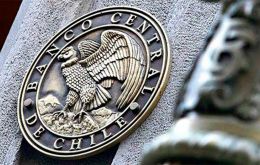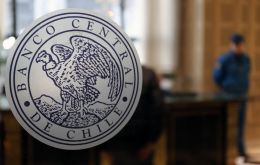MercoPress. South Atlantic News Agency
Tag: Chilean Central Bank
-
Wednesday, June 18th 2025 - 09:38 UTC
Chile's Central Bank keeps basic interest rate at 5%

Chile's Central Bank decided Tuesday to maintain the monetary policy interest rate at 5%, unchanged since December 2024, due to global economic uncertainties, particularly from escalating trade tensions and the Iran-Israel conflict in the Middle East, which pose risks to the US and global economies.
-
Saturday, August 26th 2023 - 19:18 UTC
Chilean economy in recession: declines in consumption and investments

Chile’s economy has contracted for three consecutive quarters, with significant weakness in household consumption and decline in investments. The last negative figure was reported last week by the Central Bank, showing GDP contracted by -1.1% over the same period between April and June 2023. previous year.
-
Thursday, March 9th 2023 - 10:20 UTC
Chile shows negative inflation in February

Chile recorded a 0.1% decrease in its Consumer Price Index (CPI) for the month of February of 2023 for an interannual 11.9% increase, the National Statistics Institute (INE) reported in Santiago Wednesday. It was the first negative monthly variation since November 2020.
-
Monday, July 18th 2022 - 08:56 UTC
Chile injects US$ 25 billion liquidity to contain the exchange rate and inflation

After the US dollar in Chile broke the milestone exchange rate of a thousand Pesos in June, the Central Bank reacted by announcing it will literally “flood” the market with 25bn dollars, of which 10bn to be supplied to the spot market, another 10bn covering future dollar operations, and 5bn in swap deals.
-
Wednesday, December 15th 2021 - 09:50 UTC
Chilean central bank increases interest rate reference to 4%, highest since 2014

The Chilean Central Bank's Monetary Policy meeting on Tuesday raised the reference interest rate 125 base points to 4%, the highest since June 2014. The decision came as no surprise for markets since the bank is determined to contain inflation, (6,7% in the twelve months to November) and anticipated it will continue on the path for as long as necessary.
-
Wednesday, October 13th 2021 - 15:41 UTC
Chile's “wise men” recommend the basic rate be increased 100 points to 2,5%

Chile's Monetary Policy Group, GPM, recommended on Tuesday that the Central Bank raises 100 points the Monetary Policy Rate, taking it from the current 1,5% to 2,5%, because of an upsurge of inflation and to safeguard the macroeconomic stability of the country.
-
Monday, August 30th 2021 - 08:14 UTC
Chilean central bank expected to hike the basic rate 25 points to 1%

The Chilean central bank made public on Friday its latest Survey of Financial Operators, ahead of the Monetary Policy meeting scheduled to take place next Tuesday when most market analysts anticipate the bank will decide on a 25 points increase to its basic Monetary Policy rate from 0,75% to 1%.
-
Monday, July 19th 2021 - 09:00 UTC
Chile increases basic interest rate to 0,75%, working on a two year horizon

Chilean Central Bank board members decided unanimously to increase the reference inter-bank interest rate some 25 base points to 0.75%, which represents the first rise in over two and a half years, given the improved economic prospects since the pandemic was triggered.
-
Thursday, June 18th 2020 - 13:30 UTC
Chile heading for its worst economic contraction in 35 years, central bank

The Chilean central bank said on Wednesday that the economy of the world’s top copper producer would contract between 5.5% and 7.5% in 2020, taking it to the lowest levels since the Latin American debt crisis of the 1980s.
-
Wednesday, June 17th 2020 - 08:35 UTC
Chile's government agrees with opposition US$ 12bn stimulus package

Chile’s government reached a deal with opposition lawmakers for a US$ 12 billion stimulus package over the weekend as infections hit a record and the health minister quit.
